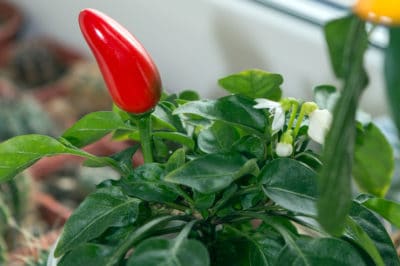Dormant State
The most common method of overwintering peppers is through keeping them in a dormant but alive state. This method will not give you fruit through the winter, but it will keep the plants alive so you can put them back out in the spring.
If your pepper plant is in the garden, dig up as much of the rootball as possible. Put it in an appropriately sized pot with all-purpose potting soil. Bring it into a basement, room, or garage; somewhere without much temperature fluctuation.
It will require a small amount of light. A windowsill or a fluorescent lamp works just fine. The plant will die back and the leaves will appear to wilt, but this is normal. It will enter a state of dormancy, trim back any damaged or dying foliage to reduce the plants’ energy consumption.
Move the plant to a brighter and warmer location as the spring approaches, about a month before the last frost date. This will allow it to gradually wake up from dormancy. Once all danger of frost has passed and the plant has regained healthy foliage and appearance you can move it back outside.
The benefits of overwintering peppers include:
- Not having to start from seed
- Full grown plant early in the season
- Achieves a much larger size over the years
- Fruit quality is reliable year after year
Watering and Feeding
The plants need for water will be drastically reduced during the winter period. Typically it will only need water once every 2-3 weeks. Check the soil for moisture before watering and if it feels damp then don’t water.
Most of the time pepper plants are sensitive to heavy nitrogen fertilization. However, during dormancy an organic liquid fertilizer containing more nitrogen is appropriate. Nitrogen encourages vegetative growth, which is what the plant will do in the winter months.
Best Varieties
Some gardeners say that hot pepper varieties will overwinter far better than sweet varieties. However, jalapeno peppers are well known for not overwintering well. Here are some varieties that successfully overwinter:
- Habanero
- Scotch Bonnet
- Tobasco
- Ghost
Remember that peppers are native to the Caribbean and the Yucatan. In these tropical climates, they naturally go through cycles of dormancy, vegetative growth, and reproduction. Overwintering is just simulating the environmental factors that incite perennial growth.
